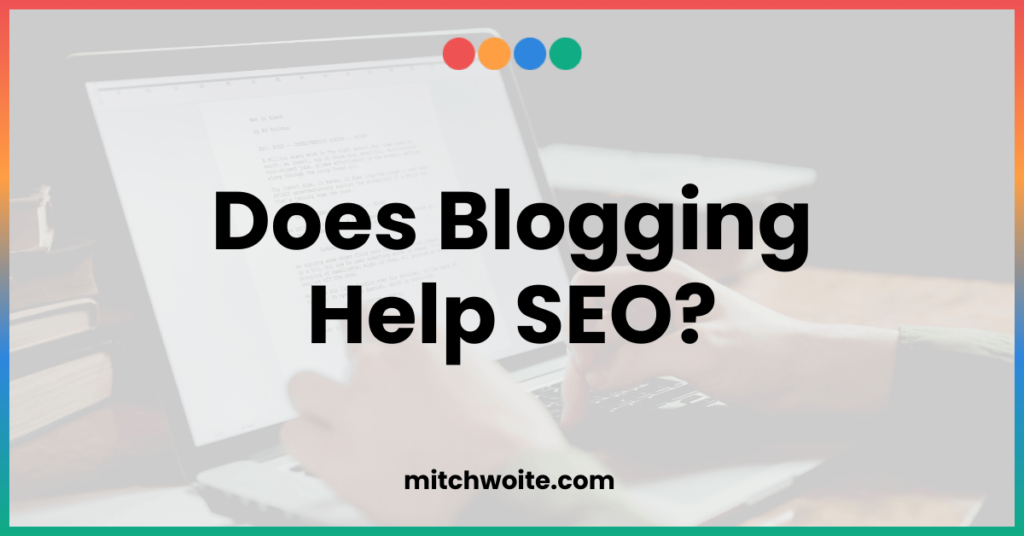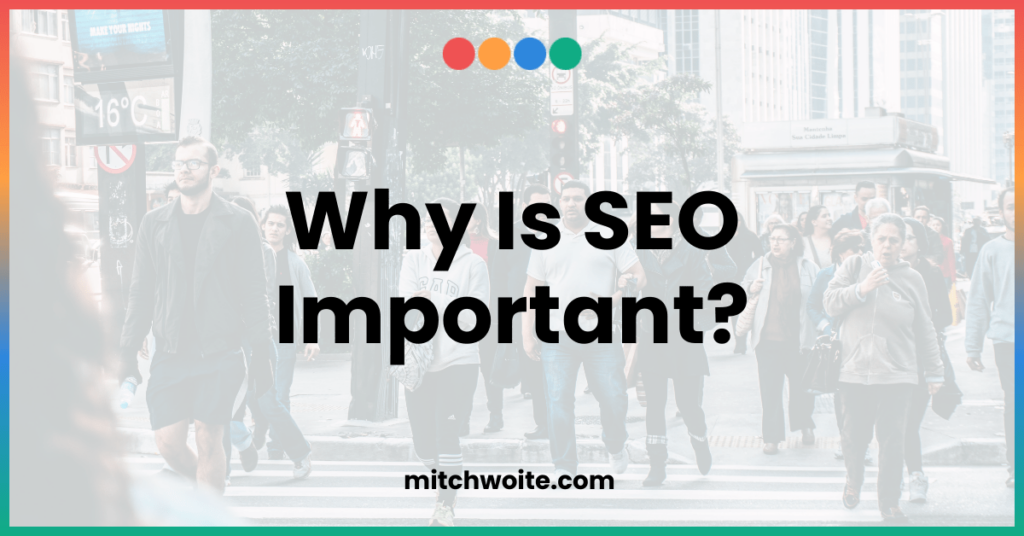Blogging can be a powerful tool for SEO (and one that I have personally found success with). In fact, HubSpot found that companies who regularly blog have 55% more website visitors than those that don’t.
It makes sense on paper – if you are writing blogs about topics people are searching for, it provides more opportunity for users to come across your website in search engines. Additionally, posting blogs can boost the power of the other pages on your website if they are linked back to.
With that in mind, here are 7 ways that blogging can help SEO.
Table of Contents
- Builds Authority
- Provides Fresh Content
- Helps Rank for Long-Tail Keywords
- Improves Internal Linking
- Engages Users
- Builds Backlinks
- Social Media Sharing
Builds Authority
At the end of the day, search engines want to provide users with content that is relevant to their search and from a trustworthy source. Google even has search quality guidelines where they reveal exactly what is important to them: experience, expertise, authoritativeness, and trust (also known as E-E-A-T). Blogs provide an opportunity to strengthen these factors.
Let’s use a car mechanic as an example. Posting blogs about topics people are searching for, such as “when should I get my tires replaced” or “when do I need an oil change” displays to Google that you are an expert in that field.
Using this strategy, you will likely attract some users that do not live where your business is located, but that is ok. As long as they are engaging with your content, you will build that authority within Google and it will strengthen your website as a whole.
Provides Fresh Content
Search engines like to see that a website is constantly being updated and improved upon. Posting blogs on a regular schedule is a great way to remind Google that your website is keeping fresh and relevant.
The HubSpot survey I referenced above also found that companies who regularly blog have 434% more indexed pages in search engines. Having more pages indexed in Google is important because it provides more opportunity for users to end up on your website.
Ironically, it can take search engines a few months to pick up on new blog posts and start ranking them consistently, so don’t be discouraged if it isn’t immediately attracting a lot of traffic.
Helps Rank for Long-Tail Keywords
Blogging is one of my favorite SEO strategies to rank for long-tail keywords. As opposed to a broad keyword (i.e. “blogs SEO”), a long-tail keyword (i.e. “does blogging help SEO”) often has much less competition.
Backlinko found that 91.8% of all search queries are long-tail keywords. While long-tail search queries do not have the pure volume that broad queries do, long-tail keywords can be easier to rank for and bring in hyper-targeted traffic.
Since they often come in the form of a question, writing SEO blogs about long-tail keywords is a great method to build that trust and authority I discussed previously.
Improves Internal Linking
Internal linking is a fundamental aspect of SEO that the average person doesn’t think twice about. Simply, it is the act of creating a hyperlink from one page on your website to another.
As you can imagine, writing blog posts about topics related to your industry provides a great chance to link back to other pages on your own website. If I was writing a post on if blogging helps SEO, it would only be natural to include a link about SEO services.
On a serious note, while I linked to my SEO services page when mentioned above, it would be annoying if I did it every single time SEO was brought up in this blog. On the flip-side, it would be poor user experience if I never linked to any relevant pages on my website when the content calls for it.
Engages Users
Done right, blogs should be engaging and useful to users. If search engines see that users landing on your website are sticking around for a while and interacting with it, it signals to them that they were correct in suggesting your website. If a user clicks to your website and leaves immediately, Google eventually picks up on the fact that nobody likes what they are seeing.
If you want to take it a step further, embedding a video into your blog post is a proven way improve engagement. Posting a video to YouTube also has the benefit of expanding your reach onto another platform and allows you to link back to your blog post in the description.
Builds Backlinks
Ideally, your blog content is so good that other people start to reference it and link to it on their website. This is known as a backlink, which can be extremely valuable depending on the source. For reference, some people pay up to thousands of dollars to build backlinks for their website.
Think about it – if a bunch of awesome and reputable websites are linking back to your blog post, it is a pretty good sign to Google that that website knows what it is talking about. Backlinks are essentially the “street cred” of SEO.
Social Media Sharing
When you create valuable and shareable content in your blog posts, it can be posted on social media platforms. While you will not receive an SEO boost directly from posting on social, it has the indirect benefit of increasing the reach of your post.
Ideally, your social media followers will engage with the content on your website and share it to their own profiles. Worst case scenario, it is one fewer piece of content you need to worry about posting!
Need a Successful Blogging Strategy? Contact Mitch Woite.
As you can see, implement a blog can be very helpful for your overall SEO strategy. My blogging and content optimization services are designed to elevate your brand’s online presence and engage your audience.
There is a lot that goes into writing an effective blog, including keyword research, proper content structure, SEO, writing engaging content, and more. However, you do not need to figure out this secret formula on your own.
Whether you need captivating articles, search engine optimization, or a complete content strategy overhaul, I’ve got you covered. Contact me today to get started.


